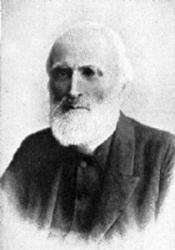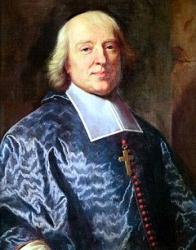Planning worship?
Check out our sister site, ZeteoSearch.org,
for 20+ additional resources related to your search.
- |
User Links
Person Results
Fenton J. A. Hort

1828 - 1892 Person Name: Fenton John Anthony Hort, 18281-892 Translator of "O strength and stay" in Complete Anglican Hymns Old and New Hort, Fenton John Anthony, D.D., was born Apr. 23, 1828, and educated at Trinity College, Cambridge, B.A. in 1st class Classical Tripos, 1850, and also in the Moral Science Tripos and the Natural Science Tripos, 1851. He has held several distinguished appointments at his University, has published several learned works, was joint editor with Dr. Westcott of The New Testament in the Original Greek, and sat as one of the Revision Committee of the New Testament. He has translation a few hymns. He died Nov. 30, 1892.
--John Julian, Dictionary of Hymnology, Appendix, Part II (1907)
Fenton J. A. Hort
Shepherd Knapp
1873 - 1946 Author of "Lord God of hosts, whose purpose, never swerving" in The School Hymnal Born: September 8, 1873, New York, New York.
Died: January 11, 1946.
Knapp attended Columbia College (graduated 1894) and Yale College (BD 1897). He served at the First Congregational Church in Southington, Connecticut (1897-1900); the Brick Presbyterian Church in New York City (assistant pastor, 1901-03); and the Central Congregational Church, Worcester, Massachusetts (1908-36). His works include:
History of the Brick Presbyterian Church, 1908
On the Edge of the Storm, 1921
Old Joe and Other Vesper Stories, 1922
The Liberated Bible: The Old Testament, 1941
--www.hymntime.com/tch
Shepherd Knapp
Eliza S. Alderson
1818 - 1889 Author of "And now, beloved Lord, thy soul resigning" in The Book of Common Praise Alderson, Eliza Sibbald, née Dykes, granddaughter of the Rev. Thomas Dykes, of Hull, and sister of the Rev. Dr. Dykes, born in 1818, and married, in 1850, to the Rev. W. T. Alderson, some time chaplain to the West Riding House of Correction, Wakefield. Mrs. Alderson is the author of the following hymns, the first of which is likely to attain a commanding position:—
1. And now, beloved Lord, Thy soul resigning. [Passiontide.] A hymn of more than usual merit, in 6 stanzas of 4 lines, written in 1868 at the request of Dr. Dykes. In 1875, stanzas i., ii., v. and vi., were given in the revised edition of Hymns Ancient & Modern, No. 121, with a special tune Commendation by Dr. Dykes. The full original text is restored in Thring's Collection, 1882, No. 170.
2. Lord of glory, Who hast bought us. [Almsgiving.] Written in 1864, in 5 stanzas of 8 lines, and published in the Appendix to Hymns Ancient & Modern, 1868, No. 372, and repeated in the revised edition 1875, No. 367, Mrs. Alderson says, "It was the very strong feeling that a tithe of our income was a solemn debt to God and His poor, which inspired it." Dr. Dykes’s tune "Charitas" was composed for this hymn.
--John Julian, Dictionary of Hymnology (1907)
=====================
Alderson, Eliza S., p. 38, i. She was born Aug. 16, 1818, and died at Kirkthorpe, Yorkshire, Mar. 18, 1889.
--John Julian, Dictionary of Hymnology, New Supplement (1907)
Eliza S. Alderson
Jacques Bridaine

1701 - 1767 Author of "My Lord, my master, at thy feet adoring" in The Hymnal Jacques Bridaine (21 March 1701 in Chusclan – 22 December 1767 in Roquemaure) was a French Roman Catholic preacher.
Having completed his studies at the Jesuit college of Avignon he entered the Sulpician Seminary of the Royal Missions of St. Charles of the Cross. Soon after his ordination to the priesthood in 1725, he joined the Missions Royales, organized to bring back to the Catholíc faith the Protestants of France. For over forty years he visited as a missionary preacher almost every town of central and southern France. When only in minor orders, he was assigned as Lenten preacher in the Church of Aigues-Mortes.
It was at Aigues-Mortes where his extreme youth provoked the derision of the people and when Ash Wednesday arrived, the church was empty. Undismayed, he put on his surplice and went out in the principal streets, ringing a bell, and inviting the people to hear him. He succeeded in filling the church with congregants who came out of curiosity but when he began in a most unusual fashion by singing a canticle about death the congregation burst out in loud laughter; whereupon he denounced the congregation. He was characteristically sensational. He wrote little and gave way to the inspiration of the moment and as a consequence his utterances at times were an incoherent jumble of incongruous figures and ideas, which clashed with each other and were often even grotesque.
It was Cardinal Maury who called attention to his exordium in the sermon on Eternity which was said to be improvised. Father Cahour, S.J., inserted it in his Chefs-d'Oeuvre d'éloquence, and Maury who wrote it from memory declared that it was worthy of Bossuet or Demosthenes. It was proclaimed at St. Sulpice before an audience of dignitaries. Nevertheless, Bridaine denounced the assembly as sinners, and bade them to tremble before him, "Today I hold your condemnation in my hand." Opinions were divided about the oratory; some finding a self-consciousness in it which was unapostolic.
He was renowned for having a sonorous and penetrating voice that could easily be heard by an audience of ten thousand people. He tended towards great theatrics to engage his audience. A supreme instance of these "methods" as he called them, and which he always insisted upon being carried out, is narrated by Madame Necker in the Nouveaux Mélanges (I, 138). He had just delivered a stirring discourse when addressing himself to the great procession which had followed him he said: "I am now going to bring you home" and he led them to the grave-yard.
In the course of his life he preached two hundred and fifty-six missions, traveling to almost every town of France in the performance of his work. Pope Benedict XIV gave him permission to preach anywhere in Christendom. Medals were struck in his honor, and the most distinguished prelates showed him the greatest reverence and affection. His Cantiques Spirituels passed through forty-seven editions, in use in most French churches. He has also left five volumes of sermons (ed. Avignon, 1823; Paris, 1861). The Protestants of France are said to have been particularly friendly to him, because of the many good offices he performed in their regard. For fourteen years he followed the spiritual guidance of a missionary like himself named Mahistre. In 1742 Cardinal Fleury proposed to establish a missionary congregation for all France under the direction of Bridaine, but the death of the cardinal caused the project to fall through.
In Paris, in 1744, his sermons created a deep impression. France was wild with excitement about him. His appeals were so powerful that in a mission which he preached at Chalon-sur-Saône in 1745 there were restitutions to the amount of 100,000 francs. His reputation as an orator was so great that even Massillon was unwilling to preach in his presence. In the course of his missions he established what he called "peace tribunals", courts composed of some of his associate missionaries, a number of irreproachable laymen, and the parish priest. To these courts all disputes were submitted and the decisions were accepted as final. His life was written by the Abbé Carron. The book was frequently translated into English, the first edition published in 1831.
--en.wikipedia.org/wiki/
Jacques Bridaine
Robin Sheldon
b. 1932 Person Name: Robin Sheldon, b.1932 Harmonizer of "STRENGTH AND STAY" in The Book of Praise
Robin Sheldon
Honor Mary Thwaites
1914 - 1993 Person Name: Honor Mary Thwaites (born 1914) Adapter of "Happy the home that welcomes you, Lord Jesus" in Hymns for Today's Church (2nd ed.) Honor Mary Thwaites was born in Australia in 1914. She attended the University of Melbourne. She went to England in the 1930s and worked with a group from the Society of Friends assisting Jewish people and others to escape from Nazi Germany.
She married the Australian poet and intelligence officer Michael Thwaites in 1939 and they returned to Australia. There she wrote several hymns that appear in Australian hymnbooks.
N Naber, Hymnary
Honor Mary Thwaites
Clifford W. Howell
1902 - 1981 Person Name: Clifford Howell, S.J. Author of "O Spring of life, creative power sharing" in The Assumption Hymnal
Clifford W. Howell
David Orea Luna
b. 1918 Person Name: David Orea Luna, n. 1918 Author of "No temas ya, pues Dios está a tu lado" in Culto Cristiano
David Orea Luna


 My Starred Hymns
My Starred Hymns


